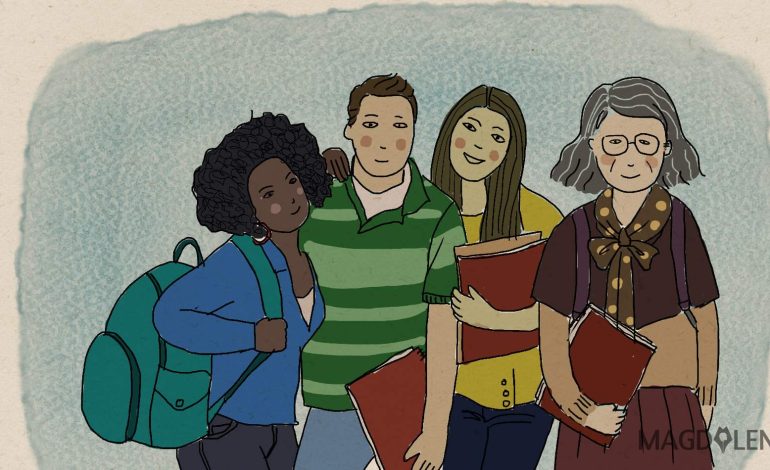Going Back to School at The ‘Appropriate’ Age of 40

My religion thinks very highly of learning. It encourages you to study from the crib to the grave or to pursue education as far as China (never mind that China, from here, is not really that far, or that other places may be better study destinations than China). Most people would translate this call for education as the conventional way of schooling: kindergarten to university all in one stretch. Earn a degree before work to get a good exposure to career choices, and maybe a chance to find a suitable life partner too.
But what if you’re a woman of 40 and married with three kids? Does learning still count as important? And what if you want to do it not as far as China but further down to, say, UK? I contemplated these questions a year ago, attempting to find justification for my going away on a master’s degree program for a whole year.
Money is tight and time precious, I would not likely be able to bring the family with me or visit them back home once I settled with my study. Could I, under this circumstance, abandon them on an excuse of “pursuing higher education” (in one of the top universities in the world notwithstanding)? Some people – surprisingly mostly female relatives and neighbors – thought this was a bad idea: how is a man supposed to cope with raising three children alone? And what if my husband felt the need to find a replacement wife?
Eight months into the study, I did receive some bad news from home. No, (to the best of my knowledge) hubby is not replacing me with another woman. Rather, our second child, six years old, had head lice so bad that the only treatment was cropping her long hair short. His brother, 12, was having a bad allergy recurrent. He coughed incessantly and lost so much weight he looked emaciated. And as our youngest was getting ready for her third birthday, she asked over Skype whether she could invite me to her party at home. Tough.
The hardest of all, however, is to get an intellectual body and mind functioning. I left my university some 17 distant years ago and, even then, after spending an arduous six years for a bachelor’s degree, a postgraduate would never be an easy journey academically. In fact, before departure, I worried I might not be able to cope with challenges and assignments. But it was somehow worse. I thought my English was all right until I heard some British/Italian/South American/Chinese friends used their “English” to speak in or outside the classroom. There were times when I nodded and showed a concerned face just to pretend I understood the sentences they uttered.
I thought my more than 12 years career as a journalist would count as a “life experience” that would boost my understanding of subjects and hence enhance my participation in class discussion. The career is probably an advantage, but it hasn’t really changed the fact that while I am the oldest female student in class, I am also the slowest to improve. The readings are dense and hard to digest. Most of the time I understand very little after devoting a long time to concentrate on hundreds of pages, and so sometimes I don’t even bother to try at all.
The assignments, usually a written paper on a particular subject, are difficult tasks that mean you (more accurately, people like myself) would stay awake night after night while dreading the deadlines. The passing grade is 50, and my collection has included a 51, a 53 and a 54.
But I count myself lucky that I started late only at a postgrad level, nobody really cares if I’m the most mature student in class (some are convinced I look far younger for my age!). Doing it at a bachelor level is even trickier, as a friend told me. She was nearly 30 when studying for her undergraduate degree in a university in the US. A previous life in three countries and unfortunate differences in education systems had hindered her from gaining a degree earlier.
Sitting in a class full of 18 year old freshly graduated from high school was definitely not easy. For one, most of the time her classmates mistook her as the teaching assistant – even the teaching assistants themselves! Many TAs started to work when they freshly graduated from university, so they were still far younger than her when they teach. Forget getting a crush on your fellow students, it is tricky enough to find classmates you could talk and relate to without referring back to age gap all the time.
In the end she prevailed and even attained her master’s degree soon after she finished the U.S. undergrad program. And this is really my biggest consolation: women had done this before, brilliantly. Mary Fasano graduated from her life-long university education dream of Harvard when she was 89. I shudder to imagine how vast the challenge must be for Ms. Fasano, but, really, some women just don’t give up education because they’re frail and wrinkly and probably facing greater difficulties than keeping up with reading list and making friends.
And, if I’m being true to myself, there is nothing like going back to school after you’ve past your prime. I may moan every couple of sentences, but studying means you were constantly challenged intellectually in a refreshing way. I never thought this possible but for the first time in my life, I fall in love with learning. Which is why it’s pertinent to quote Twila Boston, who herself earned a degree at the age of 98: “Go out in whatever you want, in whatever you want to do the rest of your life.






















